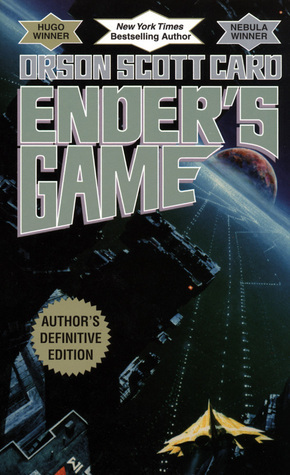
In order to develop a secure defense against a hostile alien race's next attack, government agencies breed child geniuses and train them as soldiers. A brilliant young boy, Andrew "Ender" Wiggin lives with his kind but distant parents, his sadistic brother Peter, and the person he loves more than anyone else, his sister Valentine. Peter and Valentine were candidates for the soldier-training program but didn't make the cut - young Ender is the Wiggin drafted to the orbiting Battle School for rigorous military training.
Ender's skills make him a leader in school and respected in the Battle Room, where children play at mock battles in zero gravity. Yet growing up in an artificial community of young soldiers Ender suffers greatly from isolation, rivalry from his peers, pressure from the adult teachers, and an unsettling fear of the alien invaders. His psychological battles include loneliness, fear that he is becoming like the cruel brother he remembers, and fanning the flames of devotion to his beloved sister. Back on Earth, Peter and Valentine forge an intellectual alliance and attempt to change the course of history.
This futuristic tale involves aliens, political discourse on the Internet, sophisticated computer games, and an orbiting battle station. Yet the reason it rings true for so many is that it is first and foremost a tale of humanity; a tale of a boy struggling to grow up into someone he can respect while living in an environment stripped of choices. Ender's Game is a must-read book for science fiction lovers, and a key conversion read for their friends who "don't read science fiction."
- First of all, I don't consider myself a sci-fi lover. I like some sci-fi novels, but growing up with a dad who was a mostly exclusively sci-fi avid reader, I wouldn't consider myself a "science fiction lover". That being said, I thought this was a fantastic book and I would absolutely recommend it to anybody, sci-fi lover or not.
- You get a lot of interesting comparisons between personalities in the book: Peter vs. Valentine, Ender vs. Peter, Ender vs. Valentine, Locke vs. Desmothemes, etc. Leadership styles clash, political turmoil occurs, and the environment is confined and restrained, even down on Earth or in the Internet world. It makes you really think.
- Ender's struggles throughout the novel really makes the entire books. The sci-fi aspects are just a bonus, for those who love the space setting. What makes this book really interesting is watching a child genius struggle under the weight of pressure and psychological manipulations. In the end, he is molded into this whole other Ender, but all of these obstacles have allowed him to prevail in "saving" humanity, even with these fed lies.
- I really liked how this book was very intelligently-written. There's a lot of politics in this alternate universe, some history and physics lessons, military tactics, and some interesting psychology/sociology amidst Ender's interactions with the other kids and with the teachers.
- The ending was great. The plot twists were great. The explanations behind the aliens were great. The important parts in the book were all well-implemented, without seeming cliche or forced.
- I do wish they developed Peter a little more. He seems like a very promising character with a greater role to play. However, all I really got out of him was that he was Ender's greatest enemy until Battle Station, he was a ruthless genius behind two Internet figures who became immensely popular, and that Ender continued fearing him (or being just like him) even after many years. In the end, he's referenced again as the reason why Ender can't go back to Earth, and some other things happen, but I was a bit disappointed with how that ended.
- The ending part with the queen bugger really confused me. I won't say more, for fear of spoiling it, but - what in the world was all that with the giant mountain and all those familiar icons from the games Ender played at Battle Station? I still don't understand how that ended up there, even though it was supposedly a "message." But I suppose the buggers have always been the mysterious backdrop throughout the novel. Nobody understands how they communicate with each other (though there are theories), or why they attacked us, etc.
Rating: 5 out of 5 stars!

No comments:
Post a Comment